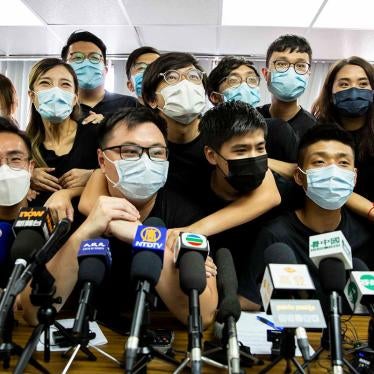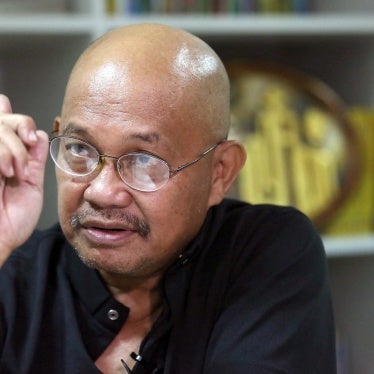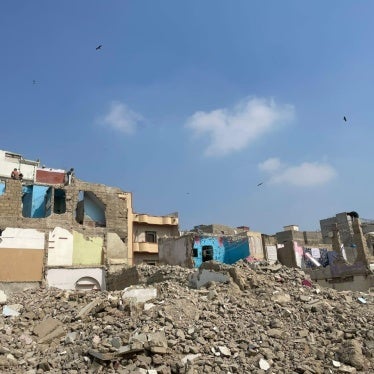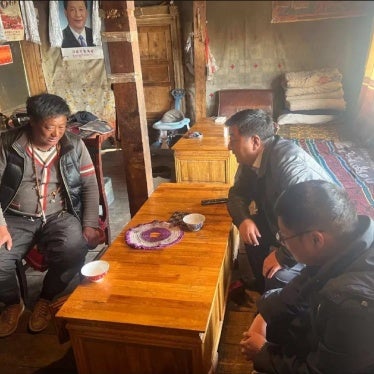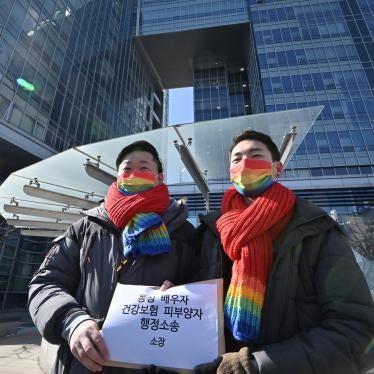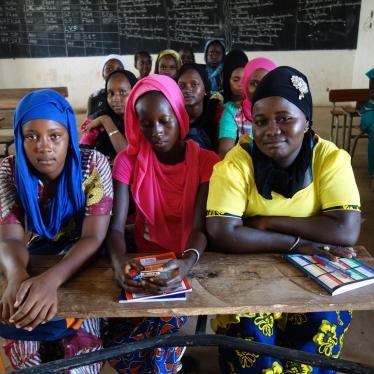My colleagues and I were supposed to meet a human rights lawyer in his Kathmandu office late last month, but when we got there, we found him surrounded by distraught victims of Nepal’s decade-long civil war between government forces and Communist Party of Nepal (Maoist) combatants.
More than 13,000 people were killed in the fighting that ended in 2006, some 1,300 disappeared, and thousands became victims of torture, including sexual assault. Both sides were responsible for serious human rights abuses.
Our visit was the day after the death of Nanda Prasad Adhikari who, along with his wife Ganga Maya, had been on a hunger strike to demand justice for their young son Krishna, allegedly shot by Maoist combatants in 2004.
Mr. Adhikari’s death 332 days into his protest had left the group feeling increasingly hopeless about their own pursuit of prosecutions and reparation: They said that the couple’s aim had not been to strike to the death, but simply to get justice for their son. Instead, Mr. Adhikari had become yet another casualty of the conflict that came to an end with a peace agreement eight years ago.
Two elections later, the opposing sides appear to agree that it is time to put the war behind them and are sitting together trying to build a consensus on a new Constitution. Although they have so far not been able to decide on the future of Nepal’s governance structure, they appear to share an interest in stalling discussions on conflict-era accountability.
In May, Nepal’s Constituent Assembly passed an act introducing a Truth and Reconciliation Commission.
But the United Nations Office of the High Commissioner on Human Rights has said the commission doesn’t conform to Nepal’s international legal obligations, and has criticized the fact that it allows for amnesty for crimes committed under international law.
Attempts by Nepal’s Supreme Court to make sure the commission conforms to international legal standards and guarantees victims the right to remedy and reparation, have failed. Although there is a petition challenging the new act still pending before the top court, criticism of the law is largely muted: The prevailing thinking is that any truth and reconciliation commission, however flawed, is better than none –since no one except the victims actually wants to see the perpetrators punished.
Government officials we spoke to agreed that justice has not been done, but still maintain that victims should have faith in the truth commission. However, questions remain about whether the commissioners will have the independence to ensure Nepal’s obligations under international law.
Fulfilling these promises is particularly important for a largely-ignored group of victims: the women and girls who suffered sexual violence during the conflict. On Sept. 23, Human Rights Watch released a report, Silenced and Forgotten: Survivors of Nepal’s Conflict-Era Sexual Violence, which documented sexual violence by both government forces and Maoist combatants during the conflict.
Many of these crimes remain unreported, with survivors isolated, traumatized, and unable to find ways to access justice and redress. The combination of immense social stigma attached to sexual assault and fear of retaliation prevented many women from speaking up about these crimes during the conflict, and still inhibits many others years afterwards.
The women in our report described a time when civilians were caught between Maoists who demanded support, including food and shelter, and government forces who punished Nepalis for providing such assistance.
Some told us how members of the security forces raped female combatants after arrest and targeted the female relatives or supporters of Maoist suspects. Other women said some Maoists raped those who refused to support them and those they forcibly recruited to help their insurgency. Some were still children when they were sexually assaulted. Others had children as a result of being raped.
The war is long over, but many victims still feel deep insecurity, and their fear impedes their ability to report and receive redress for what happened. Many of the women described domestic violence as a consequence of the conflict-era rapes. Although the government and political parties have made public commitments to provide justice and accountability for the many victims of the conflict, no provisions have been made for victims of sexual violence. The government has not included them in an interim compensation program to provide for family members of those killed or disappeared during the war.
The truth and reconciliation commission act specifies that those responsible for sexual violence are not eligible for amnesty. However, many of the victims cannot identify the perpetrators, so the authorities need to ensure meaningful investigations by identifying the relevant command units they suspect of involvement.
Under Nepali law, women have just 35 days to report sexual violence – a time limit based on the unfounded argument that establishing rape requires only forensic evidence based on medical examination of the victim.
This is an unacceptable and illogical additional hurdle to reporting rape. Several victims said they were told that they could not lodge complaints with the police as they were outside of the reporting window.
Yet, they could not have reported the rapes at the time that they occurred because of the risk of retribution: In most of the areas where these women live, a civilian law enforcement system barely functioned during the conflict.
The government is reportedly currently proposing to extend the 35-day limit to 90 days, but doing so entirely misses its responsibility to ensure that statute of limitations is the same for all serious crimes.
The Nepali government should take immediate measures to encourage women to report these crimes and seek justice. It must develop a reparations program to address critical needs of survivors of sexual violence and torture, including long-term health care and financial support.
In sum, the government needs to do a lot more to create confidence that there will be accountability for conflict-era violations. Right now, Nepal’s political establishment appears more committed to ensuring impunity.
Numerous cases like that to prosecute the killers of the Adhikari couple’s son are pending in courts—or have not even been investigated. Some of them include allegations of serious violations by government forces. For instance, another Nepali man, Purna Sunuwar, also passed away, waiting for justice. His teenage daughter, Maina was allegedly picked up by soldiers, “disappeared,” and buried ignominiously on the outskirts of an army barracks. A military court sentenced her killers to six months imprisonment after finding them guilty of only minor offences. They were simply confined to army barracks and have not been prosecuted in civilian courts.
For people like Maina Sunuwar and Krishna Adhikari, Nepal has to accept some terrible truths, and deliver justice.
Meenakshi Ganguly is South Asia director at Human Rights Watch.

